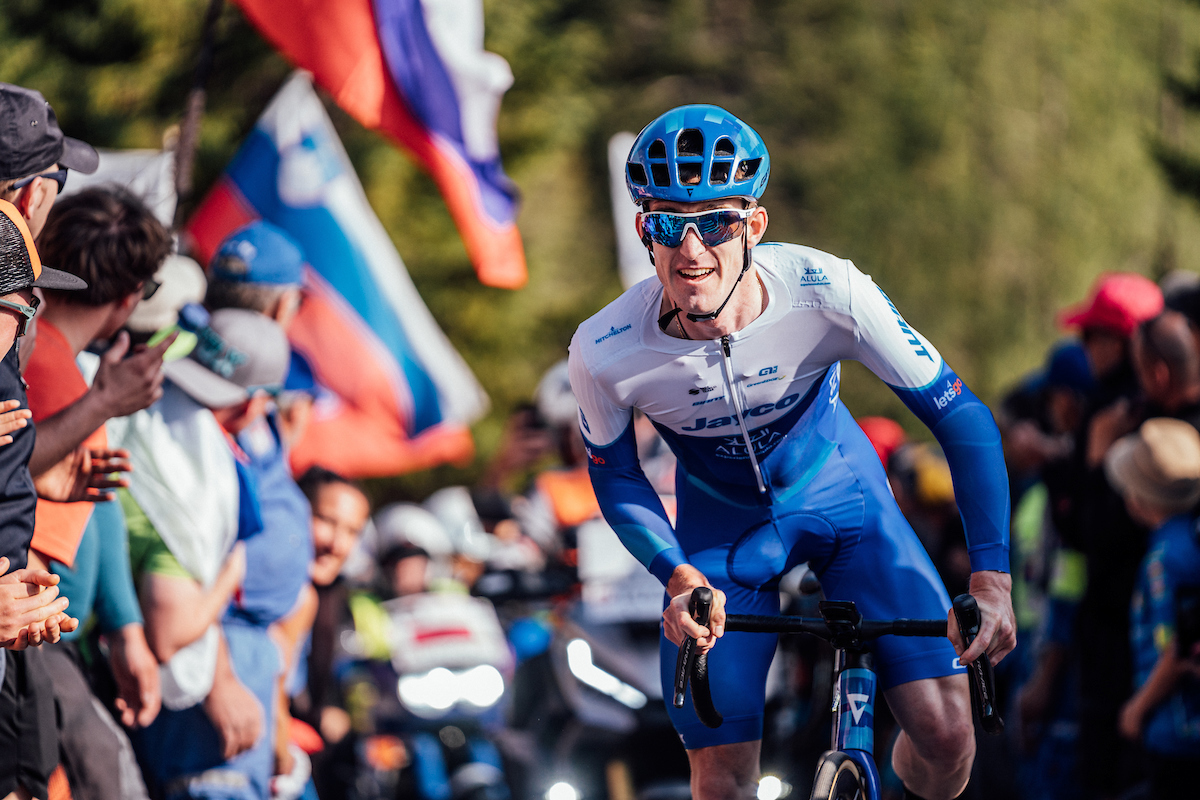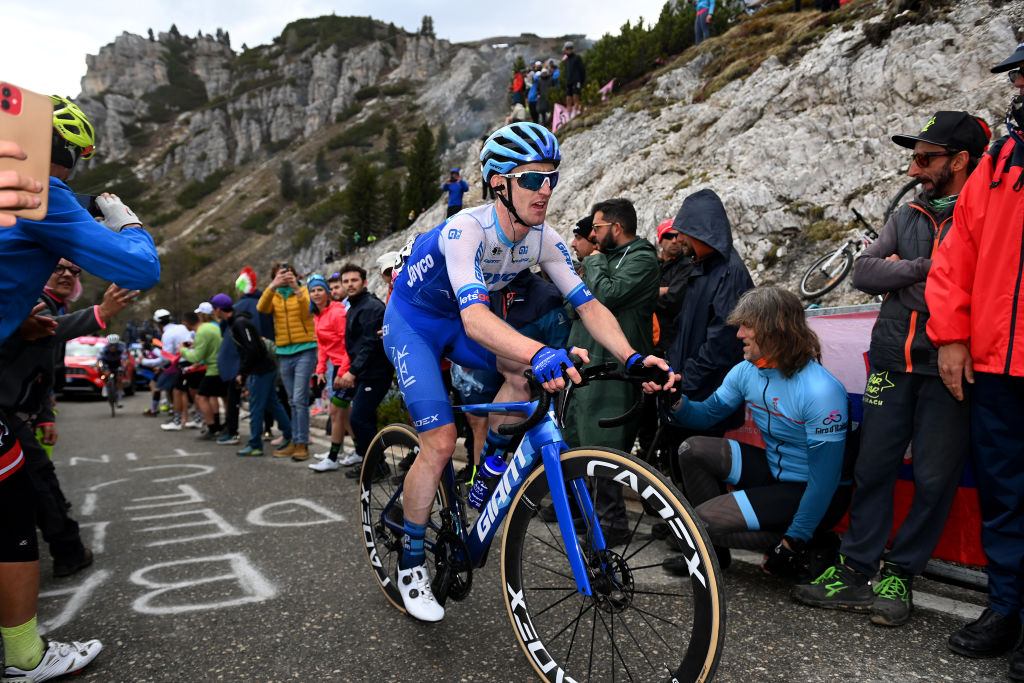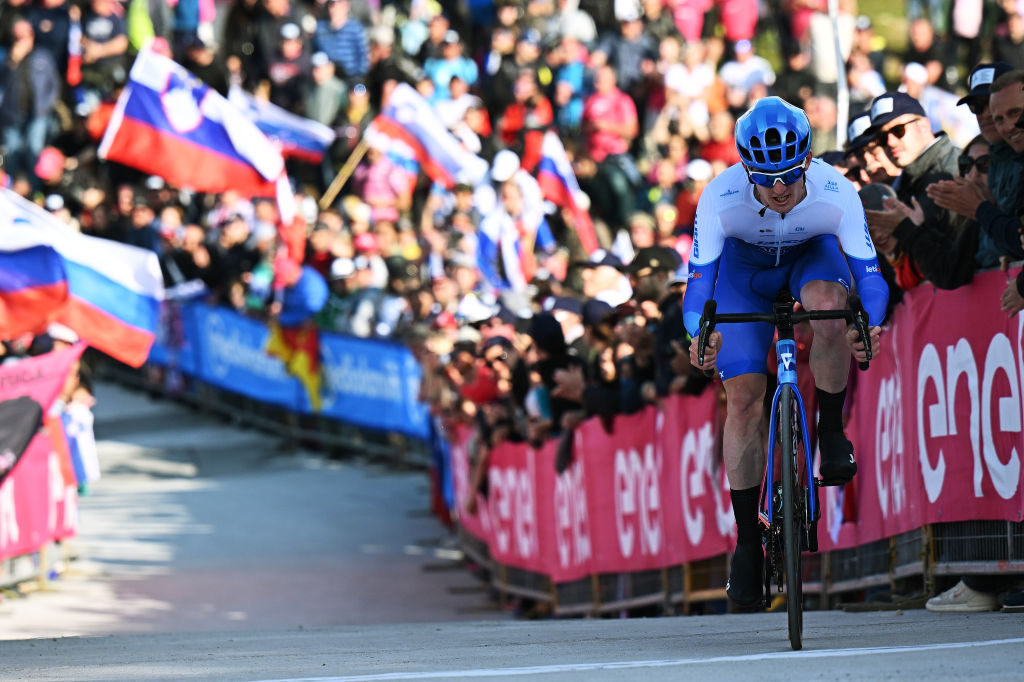
Eddie Dunbar has travelled this road before. It hasn’t made it any easier, but at least it meant that he recognised all the landmarks along the way. The journey doesn’t seem quite as daunting when you've already travelled to the destination before.
This year, as last, the Giro d’Italia is the centrepiece of Dunbar’s season and this year, as last, his itinerary to the main event had to be hastily rewritten. It didn’t do him much harm in 2023 when he reached Rome in seventh place overall. After some unwanted déjà vu in February, the Irishman will now hope for a more welcome kind of encore in Italy.
In 2023, Dunbar broke a bone in his hand in his first race as a Jayco-AlUla rider, the Volta a la Comunitat Valenciana, and he was out of action until Itzulia Basque Country in early April. This time out, he injured his hand again, in a crash at the UAE Tour. Once more, he was on the sidelines until Itzulia. Once more, he tacked on the Tour de Romandie to get some extra racing miles in his legs before the Giro.
“I’m just kind of used to it by now, and maybe that’s not a bad trait to have,” Dunbar tells Cyclingnews, laughing at the thought. “Now, I wouldn’t recommend it to anyone on a yearly basis, but I know what works. I knew that I had to get the head right and then do what I had to do.
"You learn a lot about yourself in those moments, and I’ve probably had a lot of those moments over the years. It’s hard, and it doesn’t get any easier any time it happens – but you just have to harden up and get on with it.”
Dunbar knows only too well, of course, that hardening up takes many forms. As a young talent in Danny Curtin’s stable at Kanturk CC, the great nursery of North Cork cycling, his first instinct in such moments was always to get straight back in the saddle. A severe concussion in his final year as an amateur, however, offered a bracing lesson in another form of resilience: patience.
The experience continues to stand by him. Every crash has to be absorbed, and every injury has to be respected. Given that another crash forced him out of the Vuelta a España last August, Dunbar could have been forgiven for feeling sorry for himself when misfortune struck again at the UAE Tour. Instead, he simply respected a process that has grown all too familiar.
“The first stage is the mental thing, where you think, ‘Aw fuck, not again,’” Dunbar says. “Then you have a few days off, and you start to process it a bit more. I’ve actually noticed the physical side of it more than anything in the crashes I’ve had recently. We’re not made of rubber, and they start to accumulate.
“I hit the deck four times in the last year, I think, so it took a toll on my body, but not on my head. I’ve noticed that it can take a little bit longer to recover from it each time. I’m talking like I’m 40 years of age here – but I suppose I’ve had a few more tumbles than most guys my age. That’s the impact it has. At the start, it was mental. I know how to deal with it mentally by this stage, so it’s more of a physical thing for me now.”
The physical aspect was slightly different this time out for the 27-year-old. Contrary to initial reports, Dunbar didn’t break his hand again at the UAE Tour, but the bruising to his bone was arguably more complicated to treat than last year’s fracture. “Last year, I was back on the road within a week of surgery, whereas with a bruise you have to be more cautious,” he explains.
Still, Dunbar was almost immediately on the turbo trainer, grinding through two-a-day indoor sessions during a two-week altitude camp. He was back on the road by the middle of March, splitting his training time between Monaco and his native Banteer. And, as in 2023, he returned to the peloton in time for the by-now habitual purge in the Basque Country.
“I got a good kicking there as expected,” he laughs. The Tour de Romandie, meanwhile, offered Dunbar a chance to run through his scales without straining his voice. “You can make it as hard or easy as you want the week before the Giro,” he explains of a race where he quietly withdrew ahead of the final stage.
Lingering disappointment

Dunbar arrives in Turin this week with a lingering sense of unfinished business. Twelve months ago, in his first Grand Tour as a GC leader – and, preposterously, only the second three-week race of his career – he showed a clear aptitude for the discipline. In the third week, he moved up to fourth overall after fine displays at Monte Bondone and Val di Zoldo, but illness in the dying days of the race proved his undoing.
After dropping to fifth at Tre Cime di Lavaredo, Dunbar slipped to seventh in the final time trial up Monte Lussari. A top-10 finish had more than justified Jayco-AlUla’s faith in signing him as a leader, but the achievement hardly registered with Dunbar that evening as he soft-pedalled away from a finish area already in the opening throes of Primož Roglič’s victory party.
Indeed, his dismay was such that he couldn’t even bring himself to look at the overall standings that night or in the weeks that followed. The lingering disappointment, he confesses, has remained a companion throughout his journey to this year’s race.
“When I think about last year, I just feel disappointment, really, because until that point, I think I rode well,” Dunbar says. “In the end, I dropped from fourth to seventh, which really stuck with me for a while. And it’s still with me a little bit, to be honest.”
Dunbar shakes off the idea that his disappointment should be mitigated by the fact he was battling illness. That, he maintains, is simply a part of Grand Tour racing, even if the timing, to coincide with the Dolomite tappone, could hardly have been worse. During the race, Dunbar kept his illness a secret lest his rivals looked to take advantage. Afterwards, he didn’t disclose it for fear of being seen to be making excuses.
“I was actually very badly sick, but when you’re coming forth in the Giro with two days to go, you’re not going to pull out,” he says. “But we thought there was no need to say it publicly. If people get wind of it, you don’t know how the race will change. We weren’t going to gain anything from saying it.”
In Dunbar’s youth, his default setting was to attack, and as an under-23, he was occasionally chided for contributing too generously to breakaways. Those tendencies never fully left him. On joining Team Sky in a domestique’s role in the autumn of 2018, his instinct was to snuff out attacks immediately rather than reel them in gradually per his new squad’s style guide.
Over time, however, the patience that has served Dunbar well off the bike has bled into his racing style too. He was a model of restraint at the 2023 Giro, carefully weighing his efforts as he pitted himself against Primož Roglič and Geraint Thomas. His best day came at Monte Bondone at the beginning of the third week, but even then he never allowed his judgement to be clouded by his enthusiasm. He only ever travelled as far as his stride would carry him.
“I just went day by day, riding a fairly controlled race,” he says. “I just said that if the front of the race was moving, I’d stay there as long as possible, whoever it was. That was the mentality I was trying to take every day, and after that, where you end up is where you end up.”
By the time he reached Rome, mind, Dunbar had some second thoughts about that approach. Not regrets per se, but he wondered if he might have thrown a little more caution to the wind at times, perhaps at places like Crans-Montana, where the GC riders fought out a stalemate.
“There were a couple of times when I should have backed myself,” he says now. “I was very calculating because I was well aware of what level I was at and what I could do, but maybe sometimes you have to throw that out the window to get that extra bit. At the end of the day, if the race is getting away from you, you need to get there, there’s no point in being calculating.
“There were days where I was very happy that I rode smart to a certain extent. But I think I learned a lot from it too. I just need to find that extra bit and maybe just back myself a bit more.”
An unlucky break

Dunbar is making up for lost time at the Giro in more ways than one. When he arrived at Ineos following the demise of Irish squad Aqua Blue, the idea was that he would eventually develop into a stage race rider. He impressed at the 2019 Giro, going close to a stage win in Pinerolo and placing 22nd overall, but, remarkably, he wouldn’t race a Grand Tour again during his tenure at the team.
In hindsight, the autumn of 2020 might have been the sliding doors moment of his Ineos Grenadiers career, even if Dunbar doesn’t quite view it that way. At that juncture, the Corkman was classed internally in the same bracket as Tao Geoghegan Hart and Pavel Sivakov as a man with future GC leadership potential.
He was due to ride that year’s pandemic-delayed Giro in the service of Thomas only to break his collarbone at Tirreno-Adriatico, and he watched from his couch as Geoghegan Hart fell unexpectedly into a leadership role and took pink in Milan.
“The most disappointing thing was knowing I would have been in the team if I hadn’t broken my collarbone, because we had a really good team that year, just a good vibe to be around, a nice atmosphere. We all knew our place,” Dunbar says. “But I was happy to see Tao pull it off after Geraint crashed out.”
Dunbar spent two more seasons with Ineos but was somehow sidelined from their Grand Tour thinking. Even when he played an MVP role in Richard Carapaz’s 2021 Tour de Suisse victory, Dunbar was somehow deemed surplus to requirements for the following Tour de France, where the Ecuadorian was sorely lacking in climbing support.
In 2022, when it was already clear he would not extend his contract, Dunbar was consigned to racing – and winning – on the minor league circuit at the Settimana Coppi e Bartali and the Tour of Hungary. His performances in 2023 suggested something was rather askew with Ineos’ internal evaluations during Rod Ellingworth’s time at the helm, even if he prefers to take a diplomatic line on his departure from the team.
“My contract was up, we had different visions, so it was just the right time to leave,” he says. “I saw a better pathway for myself to develop as a rider with Jayco and it turned out to be the right one. The team fitted me much better from a professional and personal point of view. I don’t think I would ever have got those opportunities at Ineos, which I understand. It was definitely the right time for a career change.”
Chasing a better position
For all the similarities between this year and last, there is one glaring difference: Tadej Pogačar’s presence completely changes the dynamic of this Giro. In the absence of men like Roglič and Jonas Vingegaard, it’s tempting to suggest that Pogacar’s real rival over the next three weeks is the race itself.
“If you’re asking me if he’s going to win the Giro, then I’d say I think so, yeah,” Dunbar laughs. “It’s hard to see any other result when you see that name on the start list. But even though it’s his first time, I think he understands the Giro and he respects it. I don’t think he’s going to come in thinking in any way shape or form that it’s already in the bag.”
It remains to be seen precisely how Pogačar will influence the rest of the race. He was, in essence, in a race of his own at Strade Bianche, the Volta a Catalunya and Liège-Bastogne-Liège this Spring. The few who tried to reach out and touch the flame were burned by the experience.
“I just try not to think about it,” Dunbar says of his approach. “If you have legs, you just hope you can stay with the best. If you don’t, then you try to stay with the second best or the third best until you get down the line. That’s all you can do.”
A similar tack to the philosophy that served him well last year, in other words. Dunbar may not have had any choice but to repeat his truncated build-up to the Giro, but he can choose his attitude during it.
“It’s hard to go into a three-week race and say what you want to get out of it, because so much can change day on day,” he says. “I just want to get through the three weeks as best as possible and hopefully end up in a better position than last year. That would be a good achievement, I think.”
Get unlimited access to all of our coverage of the Giro d'Italia – including journalists reporting, breaking news and analysis on the ground from every stage of the race as it happens and more. Find out more.







